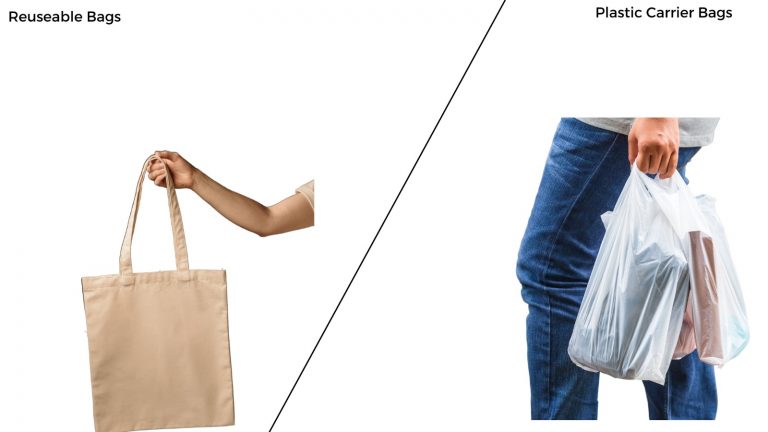Reusable Bags vs Carrier Bags

The invention and intention behind plastic bags
Since the 1960s, the rise of the Omnipresent global products such as plastic bags, has drastically increased as they were invented to carry goods. The invention of plastic bags was done by a Swedish engineer, Sten Gustaf Thulin in 1959, and it was intended to help the planet after witnessing the devastation of forests.
Plastic production surged dramatically, rising from 2.3 million tons in 1950 to 448 million tons in 2015, and it is estimated that it will double to 896 million tons by the year 2050. Annually, approximately 8 million tons of plastic waste enter the ocean from the coastal countries. To know the exact current usage of worldwide plastic, please refer to the following website (reference https://www.theworldcounts.com/challenges/waste/plastic-bags-used-per-year)
Features And Composition Of Plastic Carrier Bags
Plastic bags are lightweight, inexpensive, and durable, which is why priority is given to single-use plastic bags over reusable bags. They are usually made up of polymers of ethylene, which form polyethylene, and the degradation of this ubiquitous polymer is slower than its production and use. On average, polythene bags are only used for 12 minutes and take centuries to break down completely.
Why Did Plastic Bags Take Over Paper And Reusable Bags
The exact reason why plastic bags were able to take over reusable bags is that they were significantly stronger and cheaper, making them a convenient option for stores and customers at the same time.
However, the wide use of these plastic bags has led to environmental issues; every year, millions of tons of plastic bags are used in the United States alone. These plastic bags often end up in the ocean, posing a considerable threat to marine wildlife.
https://www.youtube.com/watch?v=GLgh9h2ePYw
The Re-Emergence Of Reusable Bags
The re-emergence of reusable bags has grown considerably; consumers are more aware of the dangerous impact plastic bags have on the environment. Reusable bags, with their convenience and multiple-use capability, are empowering consumers to make a sustainable choice. Crafted from durable materials such as cloth, cotton, jute or polypropylene, they are becoming a popular and efficient option among eco-conscious consumers.
Environmental Impact: Reusable Bags vs. Plastic Carrier Bags
In terms of sustainability, reusable eco-friendly bags have the win. However, this depends on the environmental impact of the materials; check the following points to understand why reusable bags have the edge over plastic bags.
Plastic Bags:
Pollution: Plastic bags contribute to a significant amount of waste in our environment, found in oceans, rivers, and landfills. They are hard to dispose of and can travel long distances, harming both terrestrial and marine wildlife. For instance, plastic bags can entangle marine animals, leading to injury or death, and can be mistaken for food, causing digestive issues and potentially death.
Decomposition: Plastic bags can take up to 1000 years to decompose, as the breaking down of plastic is a slow process, and they fragment into tiny particles called microplastics. These particles can easily enter the food chain and pose serious health risks to animals and humans.
Reusable Bags:
Material Usage: The carbon footprint of reusable bags entirely depends on the materials used to craft them. For example, cotton bags require a significant amount of water to be produced compared to synthetic bags. However, they can still take years to break down if not disposed of correctly.
Longevity: Reusable bags are made from more durable materials, meaning they will be kept for an extended period. Compared to plastic bags, which are designed for a single use.
Recycling and Disposal: Depending on the materials used, many reusable bags can be recycled or repurposed once they reach the end of their life cycle, which is the point at which they are no longer usable or functional. This further mitigates their environmental impact.
Practical Considerations for Consumers
We understand the environmental concerns and the practical factors that play a vital role in consumer decisions. Check out the following points to consider choosing between plastic carrier bags or reusable bags.
Convenience: Easy to carry, plastic bags are lightweight and low in cost. Compared with reusable bags, which are heavier and often cost more in stores. Although more stores are starting to avoid single-use plastic bags altogether, meaning consumers may need to look for alternatives. Reusable bags require some planning; consumers must remember to bring them to the stores, which can sometimes be challenging.
Cost: While plastic bags are often provided free by stores, it’s important to consider the long-term cost-effectiveness of reusable bags. Despite the initial investment, reusable bags, with their durability and multiple-use capability, are a financially savvy and responsible choice for consumers. This understanding can help consumers prioritize sustainability over short-term savings.
Durability: Reusable bags are made of more rigid materials than their plastic counterparts, making them resistant to everyday use and able to carry heavier items.
Conclusion
We understand that environmental concerns will continue to grow, and we will be transitioning from using plastic bags to reusable bags. By taking this step, it will not only reduce wastage but also promote more sustainability. We do understand that plastic bags offer low manufacturing costs, but in the long run, they are impacting our environment at a heavy rate. Reusable bags are the future and offer a more sustainable solution when crafted from eco-friendly materials.
For those looking to minimize their carbon footprints and save the environment, choosing reusable eco-friendly bags is a powerful and inspiring action. By bringing them into stores, individuals can make a tangible difference in reducing plastic pollution and supporting a sustainable future. Everything Promo, as part of a broader movement towards sustainability, encourages customers to be inspired and motivated to go for reusable bags instead of plastic bags.